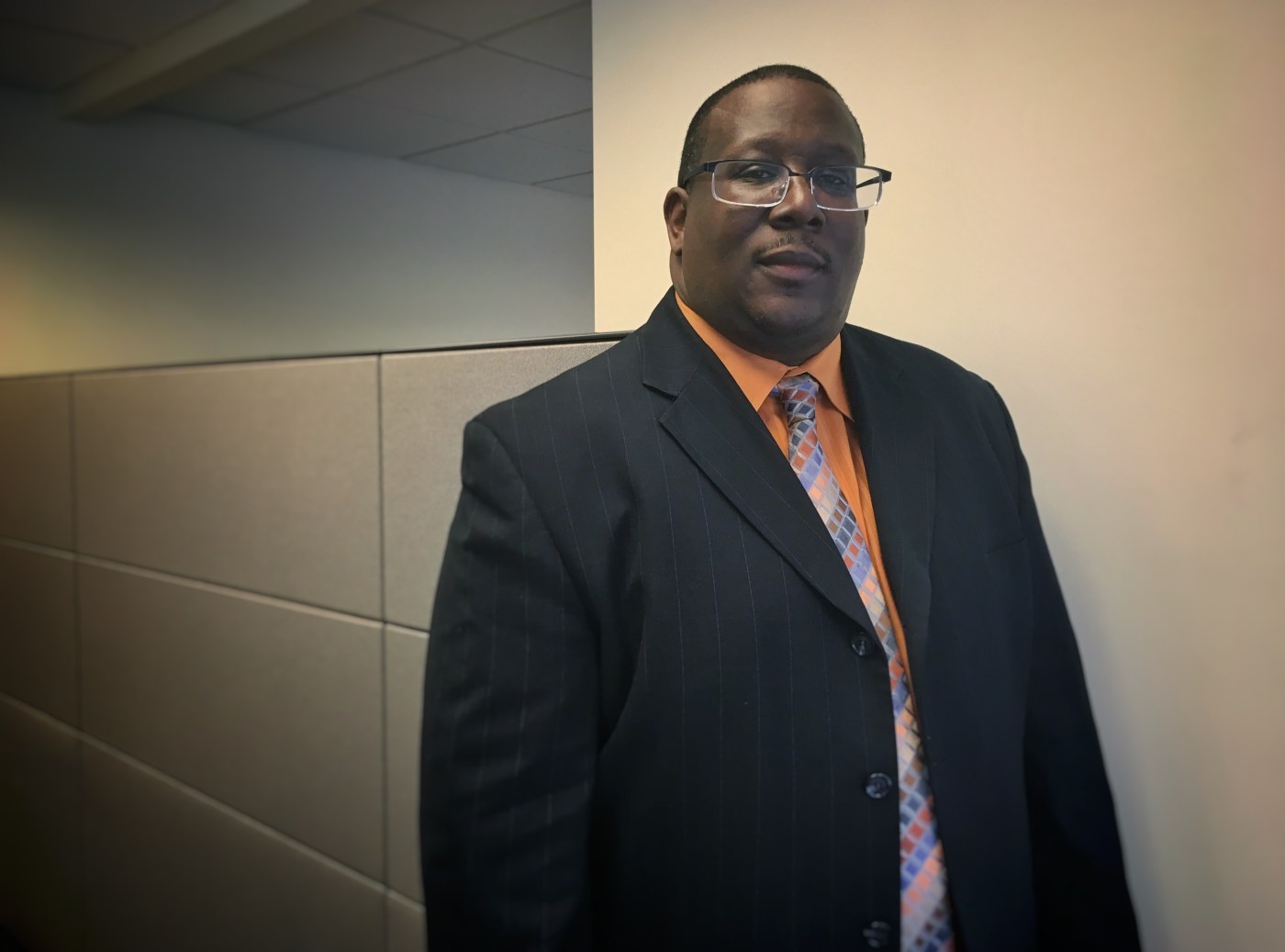Everyday, millions of hardworking Americans report to their places of duty all across the country, and these civil servants quietly work to make your lives better, safer, healthier, more productive. Today, we in the Veterans Benefits Administration want you to know who we are. We want you to know that many of us are you, and we want to share with you what it is we do and why we care.
Meet Robert Sanders, Veterans Benefits Administration’s (VBA) Transition Assistance Program’s (TAP) Chief of Operations. Soft-spoken and humble, Sanders is a friendly giant, the kind of guy you’d think would make a great police officer, where you just know he’d take a few minutes to shoot hoops with teens at a local park before returning to patrol.
In fact, that was once the plan. After six years in the army—including a deployment to Iraq for Operation Desert Shield (and Storm)—the South Carolina-native-but-Philly-claiming Sanders was waiting to take a police test when he lucked into employment with VA.
“I broke my ankle in service,” he said, “but the way I found VA was by accident. My father was driving me to what he thought was the VA hospital, but it ended up being the VBA regional office. They said, You got to the go the hospital. But on the way out, my father asked if they were hiring, and he grabbed me an application.”
Soon enough, Sanders was hired.
But with his heart still set on law enforcement, Sanders took the police test, too. In the meantime, at VA, the hard-worker got promoted. And then when he was scheduled for the police test’s physical evaluation, Sanders twisted his ankle before the test and missed it. By luck or design, Sanders kept moving up, kept learning more about VA.
Sanders enlisted in the army because he “lacked direction,” for one, but also because he wanted to follow in his grandfather’s footsteps—he had also served. The discipline and strength and restraint he learned in service carried over to his path at VA. Next January will be his 24th year.
Now, as the chief of TAP operations for VBA’s Benefits Assistance Service, Sanders works with the military branches and other partner agencies to ensure Service members are aware of their VA benefits and services upon retiring or leaving service.
VA wants service members to know that they are not alone in transitioning from the service, and learning about VA benefits doesn’t have to be at the end of an individual’s military career. There are VA resources available at installations, including benefit advisors who provide one-on-one assistance and benefit briefings. service members can contact the Transition Assistance Program manager on the installation to find the benefits advisor’s contact information.
“It’s my job to ensure that VA transition training runs smoothly in the field—at military installations,” he said. “I want them [transitioning service members] to have the info I didn’t have.
“The thing I want Vets to know is that VA has lots of support for them. YOU have to decide what, but there’s tons out there. SO much. That’s what I tell people. It blows them away to learn just how much, and that’s what we put into the TAP briefings for those who are transitioning out.”
Thank you for your service, and for continuing to serve our Veterans, Robert.
Topics in this story
More Stories
In this news post, we explore the various options designed to keep you in your home, offering hope and possible solutions for when/if you experience financial hardship.
Vietnam Veteran David Chee is among the many Native American Veterans and service members who have dedicated their lives to military service. Chee proudly served with the Army's 82nd Airborne, parachuting into the jungles of Vietnam. Chee now owns a home he purchased on Navajo tribal lands with the help of the VA Native American Direct Loan.
For Veterans, donating to charities—especially those that support fellow service members—feels like a meaningful way to give back to the community. However, Veterans and their loved ones must remain vigilant and learn to protect themselves from charity scams.







While in training at MCRD in San Diego,California in 1970 my platoon was ordered to build a human pyramid. Why? No idea! However, we finally got it almost completed before it suddenly collasped,and I was one of the unlucky guys on bottom.The weight was bone crushing and I was crushed pretty good with 74 guys on me! I was hurting all over and practically knocked unconscience. The DI didn’t even want anyone to assist me in getting to a sit up position,or, allow me to go to get medical treatment. Instead, the DI threw me a beach bucket and made me carry buckets of sand from one pile to another. I knew I was injured when everytime I urinated, a lot of blood would be in my urine. When I was finally allowed medical evaluation,I was told that I had to be discharged for medical reasons. Then,in my discharge file, one of the biggest lies known to man was typed in it,in order to protect the DI’s record due to his upcoming retirement. Now mind you, all this took place during the early months of 1970,and I have struggled with the injury/injuries since by trying to just simply live.
I filed for tinnitus and hearing loss in 2011, denied. Appealed in 2015. The BVA in Washington approved in 2016 30% disability. Back pay to 2011. Had coronary artery bypass in Dec 2016 (eschemic heart disease) due to AO exposure in Vietnam 1969-70. Filed claim in Jan 2017. Claim approved in April 2017. Now at 50% disability and receiving monthly benefit. Filed in 2016 for Peripheal Nueropathy, denied. Have sent more evidence to reopen claim. Decision expected by VA in Jan 1 to Feb 26, 2018. Advice from a friend of mine, AF veteran who after his 4 years of service went to work for VA in New Orleans and just retired, is don’t accept a denial, keep filing and have patience.
I served in the Army honorably 1957 discharged 1963. I have received zero benefits. I had two choices. Go in the military (Army) or go to jail. Is that fair? Today guys go in military by choice and get all kinds of benefits when they get out. Why not me?
The VA is a institution unlike no other. The care, the resources, and the ability to cover a seemingly endless expanse of needs of veterans is unmatched and unrivaled. I am also a veteran, so is my sibling and her husband. Without the VA two of us would not be alive, two of us would not have college degrees, including a child of a vet, and one of us would be unable to walk or work. Thanks to the VA, we are all thriving. The VA is here to help us bootstrap by providing a huge pull-up, and some of the heavy lifting is also ours to contribute to our own well-being. I can’t say enough about how awesome this organization is and continues to improve. Give them a break!
When my late husband was discharged in 1976, it was like neing fired from a job. We struggled for six years to support our three daughters. No transistion help at all. He fought the VA for 38 years, only to die two years lster and I was left behind like so many other widows.
You guys are garbage. Try rating my damn claim and stop wasting my time.